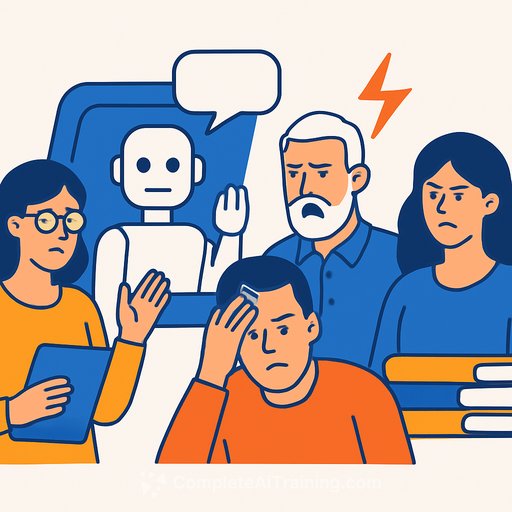Sam Altman's Low-Tech Writing Ritual: A Simple System Writers Can Use To Think Sharper
Sam Altman leads an AI company, yet his best thinking starts with pen and paper. No apps. No dashboards. A spiral notebook, torn pages on the floor, and a process that forces clarity.
If you write for a living, this is worth stealing. It's a practical stack for getting to the point faster and producing better work with less friction.
The Spiral Notebook System
Altman fills a spiral notebook every two to three weeks. He writes until an idea has shape, tears pages out, spreads them around to see multiple threads at once, then crumples and tosses each page after he types the good parts up.
The notebook must lie flat, have a hard front and back, and fit in a pocket. Favorite pens: Uniball Micro Point 0.5 or Muji 36/37 in dark blue. The point is consistency-remove excuses, keep the tools invisible, and make thinking physical.
Why Writing Still Matters (Even As AI Gets Smarter)
Altman views writing as a thinking tool. Just like learning to code trains your brain-even if code gets generated by AI-writing sharpens your internal logic and judgment.
AI now generates text, images, music, and video. None of that replaces the mental reps you get from wrestling ideas onto a page. If there were a better way to create clarity, he'd switch. He hasn't found it.
From Perfect Conditions To "Any 11 Minutes"
He used to need the perfect coffee shop, headphones, and a free morning. Now he grabs "any 11 minutes" of quiet-back of a car, before bed, whenever a window opens.
Most work happens in short bursts. He often speaks ideas out loud, then uses ChatGPT to clean up and refine, noting he's more generative by voice than by typing.
The Weekly Rhythm That Protects Focus
Weekdays: dense meetings and lots of interaction. Weekends: long quiet blocks, away from people. That cadence-input then solitude-keeps burnout in check and thinking sharp.
Long, month-on/month-off cycles used to be possible. Now the shorter weekly loop does the job.
What Writers Can Steal: A Practical Playbook
- Pick your kit: Small spiral notebook that lies flat + one pen you trust. Keep a spare in your bag.
- Write, then tear: Fill pages fast. Rip them out to compare angles. Keep only what survives typing.
- 11-minute sprints: Treat micro-windows as sessions. Title the page, set one prompt, fill it, stop.
- Voice first, text later: Talk through ideas when energy is low. Use AI to clean structure and tone.
- Weekend blocks: Reserve a quiet 2-3 hour stretch to consolidate pages, outline, and ship.
- Single source of truth: Move the keepers into a notes doc with simple tags. Trash everything else.
- Floor view: Lay pages out to see narrative flow, holes, and headlines. Re-order by hand.
- Define "done": A page is done when it's typed and scheduled-or thrown out.
A Hybrid Stack That Actually Works
Use analog to generate, AI to refine. Pen and paper for clarity. ChatGPT for structure, punch, and speed. That combo protects your voice while cutting the time to a clean draft.
If you want a fast way to explore tools that polish copy without bloating your process, see this curated list: AI tools for copywriting.
Proof You Can Trust The Pen
There's growing evidence that handwriting engages the brain differently than typing and can improve retention and understanding. For a classic take on why laptop note-taking often underperforms, see this study in Psychological Science: The Pen Is Mightier Than the Keyboard.
Want context on the conversation that inspired this? Check out David Perell's channel, where Altman discussed his process: David Perell on YouTube.
Your 7-Day Trial Run
- Day 1-2: Set up your kit. Capture three 11-minute pages per day. Tear, type, toss.
- Day 3-5: Add one short voice session daily. Use AI to clean up and outline.
- Day 6: Lay out pages on the floor. Spot the strongest thread. Build a draft.
- Day 7: Weekend deep block. Edit hard. Publish one piece.
Bottom Line For Writers
The tool isn't the point. The ritual is. Make thinking physical, keep sessions short, and let AI accelerate polish-not replace the part that makes your work worth reading.
Your membership also unlocks:






